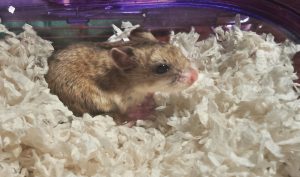 November is National Diabetes Month. In addition to raising awareness about diabetes in humans, this month is a reminder that animals can also develop the disease. Many pet owners know that diabetes can occur in dogs and cats, but did you know that hamsters can get it too?
November is National Diabetes Month. In addition to raising awareness about diabetes in humans, this month is a reminder that animals can also develop the disease. Many pet owners know that diabetes can occur in dogs and cats, but did you know that hamsters can get it too?
Diabetes mellitus is a disorder consisting of an absolute (type 1) or relative (type 2) insulin deficiency. Insulin is a hormone produced by the pancreas that acts to bring sugar (glucose) from the blood stream into the cells so that it can be utilized as an energy source. When insulin quantity or activity is decreased, the result is an elevated blood glucose concentration. High blood sugar levels overwhelm the kidneys, whose job is to filter the blood. As a result, glucose is dumped into the urine and acts as a diuretic agent to pull more water from the blood into the urine to be excreted.
To learn more, visit the Pet Diabetes Month website.
Like in cats and dogs, type 1 (or insulin-dependent) diabetes mellitus is most common in hamsters. A defect in the biosynthesis of the hormone insulin leads to elevated blood and urine sugar (glucose) levels.
Peter, a 2 ½ year old Chinese hamster, recently presented to our Avian & Exotics Department for a physical exam and was diagnosed with diabetes mellitus.
Genetics and obesity are the most common risk factors for the development of this disease in pet hamsters.
Peter was exhibiting common symptoms of diabetes, including:
• Increased thirst
• Increased urination
• Dehydration
• Weight loss
In severe cases, diabetes may lead to:
• Kidney changes
• Dental disease
• Death
Diagnosis of diabetes in hamsters is based on persistent elevation of blood sugar levels and elevated urine sugar levels. Additional diagnostics may be necessary to rule out other diseases that can present with similar symptoms.
The most important part of treatment and prevention of diabetes is providing your hamster with an appropriate diet. This includes one that is:
• High in protein
• High in complex carbohydrates
• Low in fat
An ideal diet consists of:
• A commercial pelleted diet formulated specifically for hamsters
• Fresh vegetables that are low in starches
• Low quantities of seeds or fruit
In addition to a proper diet, exercise is important to help prevent obesity and maintain an ideal body weight. In severe cases, diabetic hamsters may also be treated with oral or injectable medications to reduce the blood glucose level. Yearly wellness exams are recommended in exotic pets to help identify early signs of illness and discuss ways to keep your pet happy and healthy!
To learn more about maintaining the health in your exotic companion mammal, visit our website.